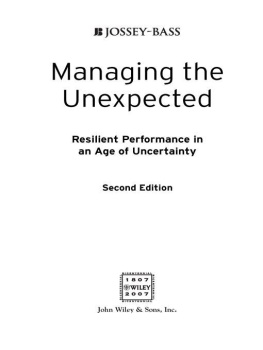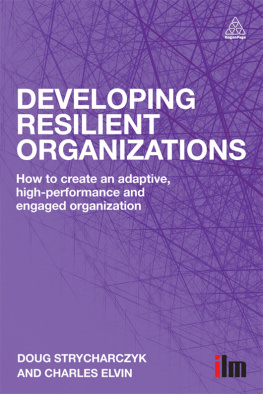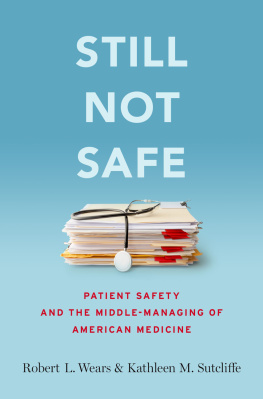Table of Contents
More Praise for the Second Edition of Managing the Unexpected
If you are concerned about how your organization will respond to an unexpected event that can easily destroy the reputation and financial health of your organization as well as you as a leader, this is the book for you. You will learn from two world-renowned experts what makes organizations susceptible to unexpected catastrophic events and what you can do to make your organization alert and responsive to unexpected and potentially destructive events.
Michael Beer, professor emeritus, Harvard Business School
and chairman, TruePoint Partners
Improving patient safety has, at long last, risen high on the priority listwhere it belongsfor health care leaders. But, as those leaders soon realize, protecting and improving safety and reliability in complex systems is not easy. Simple formulae wont work. Luckily, the technical and social sciences that underlie safe practice have been developing for many decades in sectors other than health care, with the scholarship and teaching of experts like Weick and Sutcliffe . Managing the Unexpected is a tour de force , as it explains and illustrates much of what is now known about organizational and social systems that can achieve high reliability. I know of no better introduction to safety at the state-of-the-art, and it is the first book I now recommend to health care leaders who ask me how they can best deepen their knowledge of this fascinating and crucially important field. Adapting its lessons to the world of patient care is not just possible; if we are to achieve our mission in health care, it is essential.
Donald M. Berwick, MD, MPP, president and CEO,
Institute for Healthcare Improvement
What can a manager in a global firm learn from local forest firefighters in California? Plenty. As businesses fragment their value chains and depend on a wide variety of global suppliers, their systems become fragile. There are more moving parts, few of which they directly own or control. The interlinkages are also continuously changing. In Managing the Unexpected, Weick and Sutcliffe provide an extraordinary blueprint for creating high reliability organizations in which the unexpected is the norm. Capacity to create new knowledge rapidly, substituting collaborative and integrative capacity for investment capacity, and seeing new patterns in weak signals are critical to building a culture that the authors call mindfulness in managing. The insights in this book are a must for those who want to remain at the cutting edge.
C. K. Prahalad, The Paul and Ruth McCracken
Distinguished University Professor of Corporate Strategy,
The Ross School of Business, University of Michigan
For me, Karl Weick and Kathleen Sutcliffe are the giants of the risk and resilience business. Their writings have consistently excited, inspired, and informed me over many years now. They are always beautifully written, always innovative, and marvelously rich in stories and wise paradoxes. They are a joy to read.
I am not surprised that the first edition of Managing the Unexpected has proved to be such a big hit. It reaches out equally to managers and to fellow social scientists. The book translates the five defining characteristics of high reliability organizations (HROs) into a comprehensive program for dealing mindfully with unforeseen, unanticipated, and often unwanted happenings in a variety of risky domains.
The second edition goes still further. Prominent among its new features is a brilliant chapter that describes a change program built around small shifts and alterations that produce visible and tangible results. This small wins strategy is again organized around the five defining principles of HROs: preoccupation with failure, resistance to simplification, sensitivity to the details of operations, commitment to resilience, and deference to expertise. Firefighting, both in its organized form and in its day-to-day reality, is a central theme of this chapter. I found it enriching and full of surprises. This book about dealing with the unexpected is rightly full of unexpected challenges to conventional managerial wisdom. It is perhaps the best thing they have written. I can give it no higher praise. Buy it and live by it.
James Reason, author, Managing the Risks of Organizational Accidents
The quality of responses by organizational leaders at every level to unexpected events and developments either strengthen or weaken the system. The unexpected can, therefore, be a turning point in the fortunes of organizations and their leaders. Do the right thingslike J&Js leaders in the Tylenol crisisand your stock (metaphorically and literally) will rise. Do the wrong thingslike the leaders of FEMA post-Katrinaand you will lose respect and more. But leaders cant wait until the crisis hitsthey have to prepare their organizations and keep them tuned. Weick and Sutcliffe offer valuable insights and practical advice to improve the odds that you will be leading a high reliability organization when the chips are down.
B. Joseph White, president, University of Illinois
Karl E. Weick
Kathleen M. Sutcliffe

Copyright 2007 by John Wiley & Sons, Inc. All rights reserved.
Published by Jossey-Bass
A Wiley Imprint
989 Market Street, San Francisco, CA 94103-1741 www.josseybass.com
Wiley Bicentennial logo: Richard J. Pacifico
No part of this publication may be reproduced, stored in a retrieval system, or transmitted in any form or by any means, electronic, mechanical, photocopying, recording, scanning, or otherwise, except as permitted under Section 107 or 108 of the 1976 United States Copyright Act, without either the prior written permission of the publisher, or authorization through payment of the appropriate per-copy fee to the Copyright Clearance Center, Inc., 222 Rosewood Drive, Danvers, MA 01923, 978-750-8400, fax 978-646-8600, or on the Web at www.copyright.com . Requests to the publisher for permission should be addressed to the Permissions Department, John Wiley & Sons, Inc., 111 River Street, Hoboken, NJ 07030, 201-748-6011, fax 201-748-6008, or online at www.wiley.com/go/permissions .
Readers should be aware that Internet Web sites offered as citations and/or sources for further information may have changed or disappeared between the time this was written and when it is read.
Limit of Liability/Disclaimer of Warranty: While the publisher and author have used their best efforts in preparing this book, they make no representations or warranties with respect to the accuracy or completeness of the contents of this book and specifically disclaim any implied warranties of merchantability or fitness for a particular purpose. No warranty may be created or extended by sales representatives or written sales materials. The advice and strategies contained herein may not be suitable for your situation. You should consult with a professional where appropriate. Neither the publisher nor author shall be liable for any loss of profit or any other commercial damages, including but not limited to special, incidental, consequential, or other damages.
Jossey-Bass books and products are available through most bookstores. To contact Jossey-Bass directly call our Customer Care Department within the U.S. at 800-956-7739, outside the U.S. at 317-572-3986, or fax 317-572-4002.
Jossey-Bass also publishes its books in a variety of electronic formats. Some content that appears in print may not be available in electronic books.
Library of Congress Cataloging-in-Publication Data Weick, Karl E.
p. cm.
Includes bibliographical references and index.
ISBN 978-0-7879-9649-9 (cloth)
Next page











